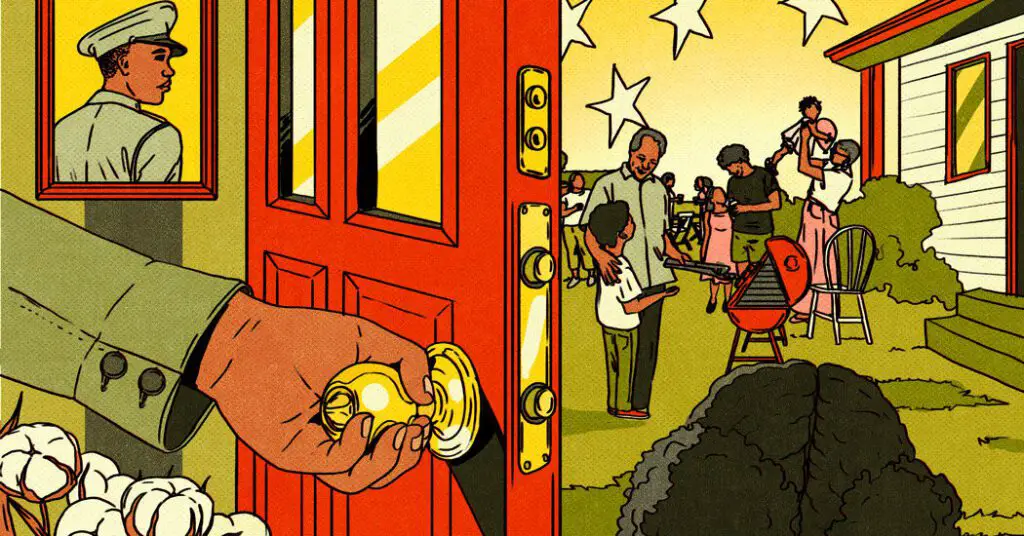
Patriotism means telling truth past: Patriotism did not bring my grandfather to the Army Recruiter’s office in 1956. Poverty did. A young man working odd jobs to help pick cotton and feed his family meant he was well on his way to graduating high school as his 18th birthday approached. He wanted a better life for himself and saw the Army as a way to make it.
He stayed three years beyond his initial three-year commitment. A sepia-toned photograph of him in uniform still hangs proudly in Alana’s bedroom in Huntsville.
For my grandfather, military life was not without its challenges. He recalls that he and other black soldiers were constantly addressed as “boys” until he stood up to his commanding officer and told him that there were nothing but men in his unit. After this tense and dangerous exchange, the officer addressed him respectfully—a small victory that my grandfather never forgot.
I asked him why he continued and he replied, “I think I love America more than I thought. I definitely liked it more than Russia.
The military was the first integrated space he encountered. “We served together, marched together, slept in the same barracks and learned to respect each other,” he said. During his six years of service, he completed high school and took extra classes. He returned to civilian life armed with certificates as a fireman, merchant seaman and bookkeeper. But no one in Alabama in the 1960s would hire him to do any of that. His first job was as a janitor.
My grandfather’s feelings about America are at once fond and critical. He loved his unit and the moments when the white men he served with were his equals. He also laments the times when he was not, especially in his later civilian years. Now, at 86, he gets animated about how he never got to be a fireman.
His story embodies the great contrast of America being the land of opportunity and one that thwarts it at so many turns.
To my kids, he’s almost a mythical figure straight out of the American history books. Despite all that – he opened his own music store in the 1990s – he can’t help but think there could be more.
It’s a connection to my children’s past that they don’t understand.
My children aren’t the only ones who don’t know what to make of my grandfather’s story or his complex form of patriotism that clings tightly to affection despite a deep sense of betrayal.
In this country we have come to see patriotism as a positive account of our history that treads lightly on the country’s sins. The Fourth of July in particular is a time to wrap up in flags, grill up some meat, and indulge in a playlist of songs that praise Americana. Talking about slavery, Jim Crow, economic exploitation and what happened to black soldiers after they finished their service ruins the vibes.
It costs nothing to sing along to “God Bless America.” It takes a lot to trust a place that has failed you.
As an African American who speaks out on anti-black racism, I often hear, “If you hate America so much, you should leave.” But I don’t count my grandfather’s story because I hate America. I say that because ignoring stories like that will hinder us from becoming a better country. On the flip side of honesty is the possibility of change. For me, telling the truth is the most promising form of patriotism.
Often we worry that if we tell our children about our complex and sometimes dark history, their response will be debilitating shame. But instead of lying to our youth, we can give them a task that demands the best from them. We can call upon them to bridge the gulf that often erupts between our ideals and practices. This is the gift the past gives us, an opportunity to turn away from old evils and pursue new ones.
It is not enough to imagine Paul Revere riding down the road shouting warnings about redcoats or aboard a boat preparing to storm the beaches of Normandy. We should note that the Liberty Revere helped win was for some Americans, not all. We must recognize that African Americans Those who risked their lives on that beach in France returned to the ethnically divided country in which they were targeted lynching.
This year, my mother’s side of the family will be hosting a reunion over the 4th of July weekend. We’ll grill and set off the crackers like everyone else. We might hear Marvin Gaye Or of Whitney Houston A rendition of the national anthem while we wait for the meat to finish cooking.
This country will also be criticized, especially since it is election season. That is all we have to say. We will talk about my family’s long journey from plantation to the present freedom we enjoy. That story has its own blend of tragedy and triumph. We will talk about my grandfather’s service with his father and two of his uncles, all three of whom fought in World War II. A cousin also served in my generation.
These feelings of love, pride and regret can reside in the same heart. It is the truest form of patriotism, a love that is not complacent, that demands more than a morsel on the table of justice. Patriotism means telling truth past